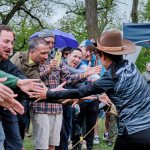Club and community engagement is a crucial aspect of modern society, as it allows individuals to come together, share ideas, and work towards a common goal. Whether it’s a social club, a sports team, or a community organization, engagement is essential for building stronger connections and fostering a sense of belonging.
The Importance of Club and Community Engagement
Engagement is vital for individual and collective well-being. When individuals are involved in clubs and community organizations, they are more likely to:
- Develop new skills and knowledge
- Meet new people and make friends
- Gain a sense of purpose and fulfillment
- Improve their physical and mental health
- Take on leadership roles and develop leadership skills
Types of Clubs and Community Organizations
There are numerous types of clubs and community organizations, catering to diverse interests and needs. Some examples include:
- Social clubs: book clubs, hobby clubs, and recreational groups
- Sports teams: athletic teams, recreational leagues, and fitness groups
- Community organizations: volunteer groups, advocacy organizations, and charity organizations
- Cultural organizations: cultural centers, language schools, and cultural festivals
Benefits of Club and Community Engagement
Club and community engagement offers numerous benefits, including:
- Improved mental and physical health
- Increased social connections and friendships
- Enhanced skills and knowledge
- Increased sense of purpose and fulfillment
- Improved community cohesion and sense of belonging
Challenges and Barriers to Engagement
Despite the numerous benefits, there are several challenges and barriers that can prevent individuals from engaging in clubs and community organizations. Some examples include:
- Lack of awareness or knowledge about available options
- Fear of rejection or exclusion
- Time constraints and busy schedules
- Financial limitations or lack of resources
- Social anxiety or shyness
Overcoming Challenges and Barriers
To overcome the challenges and barriers to engagement, it’s essential to:
- Research and explore available options
- Start small and take calculated risks
- Find a supportive community or group
- Celebrate small successes and accomplishments
li>Be open-minded and willing to learn
Conclusion
In conclusion, club and community engagement is a vital aspect of modern society, offering numerous benefits for individual and collective well-being. While there are challenges and barriers to engagement, it’s essential to overcome these hurdles and find ways to get involved. By doing so, individuals can develop new skills, make new connections, and contribute to a stronger, more cohesive community.
FAQs
Q: What are some ways to get started with club and community engagement?
A: Some ways to get started include attending local events, joining online forums or social media groups, and reaching out to local organizations or clubs to learn more about their activities and membership requirements.
Q: How do I find a club or community organization that aligns with my interests?
A: You can start by researching online, attending local events, and talking to friends and family members who may be involved in similar activities. You can also reach out to local community centers, libraries, or places of worship to learn more about available options.
Q: What if I’m shy or introverted? How can I still get involved?
A: It’s completely normal to feel shy or introverted, but there are still ways to get involved. You can start by joining online forums or social media groups, attending small group meetings, or participating in activities that allow you to contribute without having to be the center of attention.
Q: How can I make the most of my club and community engagement experience?
A: To make the most of your experience, be open-minded, willing to learn, and respectful of others. Take the time to get to know others, ask questions, and be patient with yourself as you navigate new relationships and activities.








